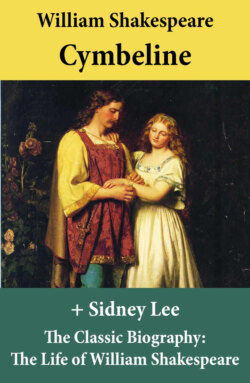Читать книгу Cymbeline (The Unabridged Play) + The Classic Biography: The Life of William Shakespeare - William Shakespeare - Страница 24
На сайте Литреса книга снята с продажи.
SCENE VII.
ОглавлениеEnter Belarius, Guiderius, and Aruiragus
Bel. You Polidore haue prou’d best Woodman, and
Are Master of the Feast: Cadwall, and I
Will play the Cooke, and Seruant, ‘tis our match:
The sweat of industry would dry, and dye
But for the end it workes too. Come, our stomackes
Will make what’s homely, sauoury: Wearinesse
Can snore vpon the Flint, when restie Sloth
Findes the Downe-pillow hard. Now peace be heere,
Poore house, that keep’st thy selfe
Gui. I am throughly weary
Arui. I am weake with toyle, yet strong in appetite
Gui. There is cold meat i’th’ Caue, we’l brouz on that
Whil’st what we haue kill’d, be Cook’d
Bel. Stay, come not in:
But that it eates our victualles, I should thinke
Heere were a Faiery
Gui. What’s the matter, Sir?
Bel. By Iupiter an Angell: or if not
An earthly Paragon. Behold Diuinenesse
No elder then a Boy.
Enter Imogen.
Imo. Good masters harme me not:
Before I enter’d heere, I call’d, and thought
To haue begg’d, or bought, what I haue took: good troth
I haue stolne nought, nor would not, though I had found
Gold strew’d i’th’ Floore. Heere’s money for my Meate,
I would haue left it on the Boord, so soone
As I had made my Meale; and parted
With Pray’rs for the Prouider
Gui. Money? Youth
Aru. All Gold and Siluer rather turne to durt,
As ‘tis no better reckon’d, but of those
Who worship durty Gods
Imo. I see you’re angry:
Know, if you kill me for my fault, I should
Haue dyed, had I not made it
Bel. Whether bound?
Imo. To Milford-Hauen
Bel. What’s your name?
Imo. Fidele Sir: I haue a Kinsman, who
Is bound for Italy; he embark’d at Milford,
To whom being going, almost spent with hunger,
I am falne in this offence
Bel. Prythee (faire youth)
Thinke vs no Churles: nor measure our good mindes
By this rude place we liue in. Well encounter’d,
‘Tis almost night, you shall haue better cheere
Ere you depart; and thankes to stay, and eate it:
Boyes, bid him welcome
Gui. Were you a woman, youth,
I should woo hard, but be your Groome in honesty:
I bid for you, as I do buy
Arui. Ile make’t my Comfort
He is a man, Ile loue him as my Brother:
And such a welcome as I’ld giue to him
(After long absence) such is yours. Most welcome:
Be sprightly, for you fall ‘mongst Friends
Imo. ‘Mongst Friends?
If Brothers: would it had bin so, that they
Had bin my Fathers Sonnes, then had my prize
Bin lesse, and so more equall ballasting
To thee Posthumus
Bel. He wrings at some distresse Gui. Would I could free’t
Arui. Or I, what ere it be,
What paine it cost, what danger: Gods!
Bel. Hearke Boyes
Imo. Great men
That had a Court no bigger then this Caue,
That did attend themselues, and had the vertue
Which their owne Conscience seal’d them: laying by
That nothing-guift of differing Multitudes
Could not out-peere these twaine. Pardon me Gods,
I’ld change my sexe to be Companion with them,
Since Leonatus false
Bel. It shall be so:
Boyes wee’l go dresse our Hunt. Faire youth come in;
Discourse is heauy, fasting: when we haue supp’d
Wee’l mannerly demand thee of thy Story,
So farre as thou wilt speake it
Gui. Pray draw neere
Arui. The Night to’th’ Owle,
And Morne to th’ Larke lesse welcome
Imo. Thankes Sir
Arui. I pray draw neere.
Exeunt.
